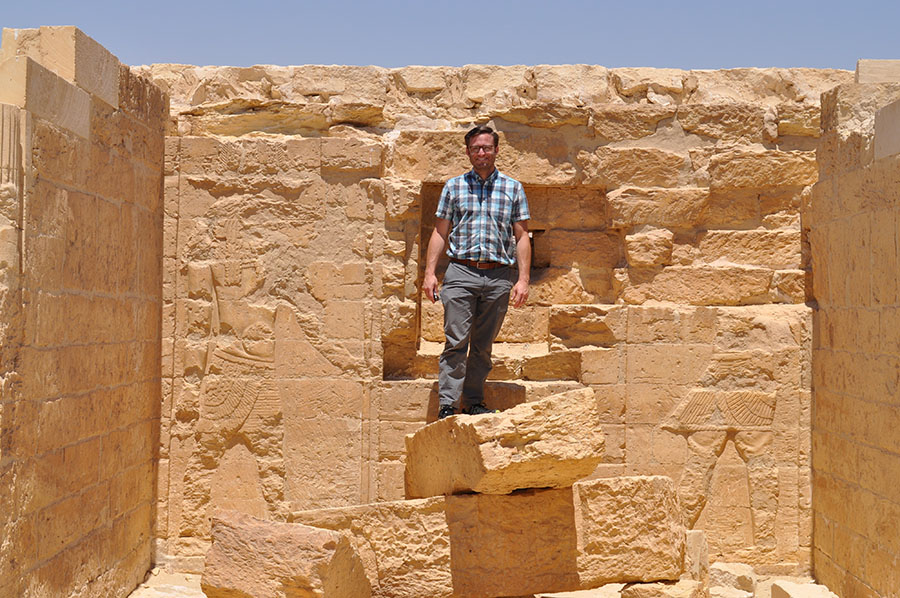BOONE, N.C.—Dr. Davis Hankins of Appalachian State University is one of 10 winners of the Manfred Lautenschlaeger Award for Theological Promise this year. It is an international award given annually by the Forschungszentrum für Internationale und Interdisziplinäre Theologie (Research Center for International and Inter¬disciplinary Theology) to outstanding first books in theology and is a most prestigious award in the field of religious studies. He received this award for his work “The Book of Job and the Immanent Genesis of Transcendence” (Northwestern University Press, 2015).
At Appalachian, Hankins is an assistant professor of religious studies in the College of Arts and Sciences and a faculty affiliate in the Center for Judaic, Holocaust and Peace Studies and the gender, women’s and sexuality studies program. Hankins utilizes modern literary and philosophical theory to study history, literature, religion and society.
“It is great to see Dr. Hankins’ passion about the history, psychology and philosophy of the Bible recognized with this international award. Appalachian students are lucky to have teachers like him who combine fun classes with world-class research,” said Dr. Kevin Schilbrack, chair of the Department of Philosophy and Religion.
Why the Book of Job
With his first book, Hankins sought to demonstrate why the Book of Job from the Bible continues to be important for philosophical studies of contemporary questions such as the limits and possibilities of desire, perception, existence and belief. He raises questions about spirituality, ethics, and the role of trauma and disaster, which are part of Job’s experience, in individual and social life.
The Book of Job delves into issues faced by every human who experiences suffering. God and Satan afflict Job with pain and turmoil. Then, human wisdom wrestles with the unexplainable, until God intervenes, adding further witness to the limits of the world’s coherence and to the wildness of its creatures.
The Book of Job is often read as a folktale about these limitations of being human. Hankins maintains it is a demonstration of the real drama of struggle through an unpredictable transformation. He demonstrates how the Book of Job is relatable to our existence in even today’s world.
Hankins, originally from Charlotte, nurtured his interest in the Book of Job during his graduate studies at Emory University with biblical scholar Dr. Carol A. Newsom, his doctoral advisor and an expert on Job.
“Today, everyone talks about the importance of being interdisciplinary, but for most people that means just having a passing acquaintance of another field. Davis Hankins was different. He immersed himself in the most difficult aspects of continental philosophy,” said Dr. Carol A. Newsom, Charles Howard Candler Professor of Old Testament at Candler School of Theology and the Graduate Division of Religion at Emory University in Atlanta.
“In recent years continental philosophers have become attracted to the Bible. To biblical scholars it’s clear very quickly that they don’t really understand the nature of biblical studies,” Newsom said. “But Davis is that almost unique individual who truly understands both fields as an insider. Consequently, his work is sophisticated both to biblical scholars and to philosophers. Appalachian should be very proud to have a scholar of his stature. Honestly, I don’t think there is anyone else like him right now working either in the field of biblical studies or in philosophy,” said Newsom.
Reaching Theological Promise
Formerly the John Templeton Award of Theological Promise (2007-2011), the Manfred Lautenschlaeger Award for Theological Promise was founded to support young scholars for Ph.D. dissertations or first monographs. The prize was given to 10 researchers from diverse regions of the world each year from 2013-17, by a committee of 23 members from 18 different countries.
According to Hankins, multiple copies of his book were required for review, an essay about his book and recommendations from senior faculty for his submission. Once selected for this prestigious award, winners were hosted in May in Heidelberg, Germany, and received a cash prize. The winners participated in a colloquium over several days during which they presented their research for their next big projects. This experience thus began an ongoing, open network of international and cross-disciplinary scholars in the early stages of their careers.
“For Davis Hankins, the Lautenschlaeger Award is richly deserved. His thoroughly interdisciplinary work breaks new ground in several fields at once, most notably in biblical studies, philosophy and psychoanalysis. Davis’ book is also a testament to the excellent research and teaching capacity of the Religion and Philosophy department at Appalachian State University,” said Dr. Brennan W. Breed, assistant professor at Columbia Theological Seminary, in Decatur, Georgia.
Up Next: Egypt and the Book of Ecclesiastes
Hankins is working on his next book evaluating the historical and influential use of the Book of Ecclesiastes. He is co-authoring the project with. Breed. Hankins extended his summer trip to Germany to include time for research with the assistance of a SAFE grant from the College of Arts and Sciences at Appalachian.
Breed and Hankins met in Cairo, Egypt to conduct research relevant to their work on the historical transformations that occurred while the Ptolemies ruled Egypt, Syria and Palestine, which is when Hankins and Breed believe the Book of Ecclesiastes was written. They then traveled to Italy to study more artifacts related to their work on the Book of Ecclesiastes. This book of the Bible was written during a time of social and economic change that profoundly impacted the development of Jewish thought.
Hankins attributes his varied interests in his study of religion through literature, art, philosophy and psychology to a broad liberal arts education. In his educational years, he strived to take advantage of the array of classes available from philosophy and history to psychology and religion in order to answer similar cross-disciplinary questions, but with a broader perspective.
Hankins advice to students would be: “Make space in your curriculum for exposure to various disciplines. It becomes increasingly difficult as you advance in your specialization, so take advantage of your opportunities as early and often as possible.”
%%3%%About the Forschungszentrum für Internationale und Interdisziplinäre Theologie (FIIT)
FIIT, founded in 2005, is a research center for international and interdisciplinary research in academic areas relating to theology and society. The center has created a network comprised of fifteen departments that focus on research projects in the areas of anthropology and ethics, biblical studies and global developments as well as religion, culture, and education.
FIIT has initiated a Global Network of Research Centers for Theology, Religious, and Christian Studies comprised of 45 institutions of higher education worldwide to arrange for scholarly exchange by doctoral and postdoctoral students.
About the Department of Philosophy and Religion
The Department of Philosophy and Religion invites students to explore the world, examine beliefs, understand a diversity of worldviews, and challenge the ideas and values that instruct our lives. The department offers a B.A. in philosophy and a B.A. in religious studies, as well as a minor in both of these areas. It also offers a concentration for education majors. Learn more at http://philrel.appstate.edu.
About the College of Arts and Sciences
The College of Arts and Sciences is home to 16 academic departments, two stand-alone academic programs, two centers and one residential college. These units span the humanities and the social, mathematical and natural sciences. The College of Arts and Sciences aims to develop a distinctive identity built upon our university’s strengths, traditions and unique location. Our values lie not only in service to the university and local community, but through inspiring, training, educating and sustaining the development of our students as global citizens. There are approximately 5,850 student majors in the college. As the college is also largely responsible for implementing Appalachian’s general education curriculum, it is heavily involved in the education of all students at the university, including those pursuing majors in other colleges. Learn more at http://cas.appstate.edu.
About Appalachian State University
As a premier public institution, Appalachian State University prepares students to lead purposeful lives. App State is one of 17 campuses in the University of North Carolina System, with a national reputation for innovative teaching and opening access to a high-quality, cost-effective education. The university enrolls more than 21,000 students, has a low student-to-faculty ratio and offers more than 150 undergraduate and 80 graduate majors at its Boone and Hickory campuses and through App State Online. Learn more at https://www.appstate.edu.
What do you think?
Share your feedback on this story.




![How NCInnovation Is Rethinking Economic Development in North Carolina [faculty featured]](/_images/_posts/2026/02/rethinking-economic-development-600x400.jpg)








